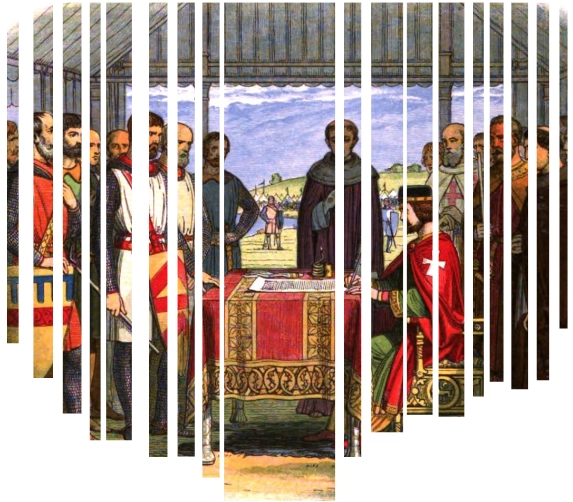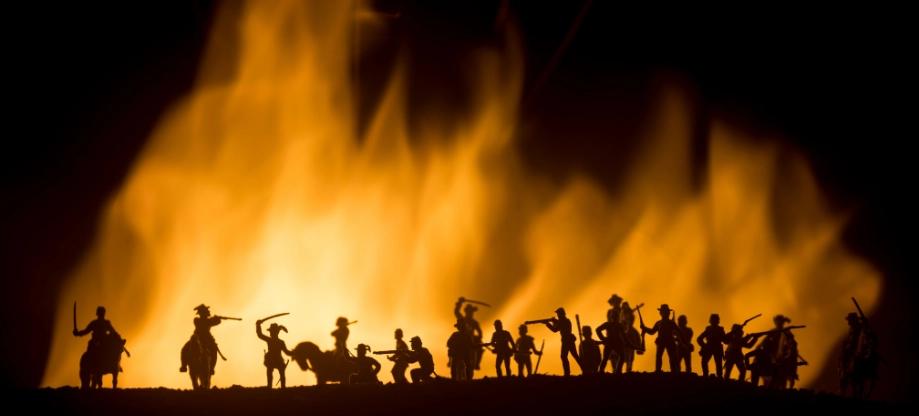Since ancient times, complex states have consistently been shaped and sustained by the interplay of three archetypal forces: potentates, princes, and prelates. Despite the sometimes shiny veneer of change and modernity, the role of these three political players in the state hierarchy remains remarkably unchanged, a testament to the resilience of the old order masquerading as progress.

The generals, wielding the instruments of conquest and colonialism, laid the foundations for all the ancient expansive states. Assimilation was generously allowed for those willing to surrender their autonomy; the sword dispatched others who had resistance in their minds and tongues. For centuries, such was the universal formula for founding new states—all contemporary continental-scale powers—whether America, China, or Russia—followed this timeworn strategy. The potentates, exalted as “great” founding fathers, enjoyed an aura of reverence; it bestowed upon them enduring powers. Once the sword had been sheathed and the frontiers secured, these figures continued to loom large over the political landscape, their legacies enshrined in the myths of national origin.
The princes, typically the offspring and successors of the original potentates—those masterful politicians of yesteryears—ascended to the echelons of power armed with the dual arsenal of deception and domination. Most ruled their inherited dominions through a blend of brute force and refined fraud, maintaining their grip on power. Yet, a handful managed to cultivate a façade of civility over time, becoming patrons of the arts and commissioning architectural splendors—though, in truth, their so-called magnanimity served little more than to gild their own egos and immortalize their vanity. The real prowess of these princes lay in revenue administration, deft negotiations, and political maneuvering—those who did not lead armies had to keep a watchful eye on their potentates, lest a trusted general turn out to be a Suri to a Humayun. In times of peril, these princes found themselves beholden to their own creations, the potentates, whose loyalty was often as fickle as a courtier’s flattery.

With their silver tongues, the prelates secured their positions within the court—what might be termed the cabinet in today’s parlance—courtesy of the princes’ invitation. These clerics, guardians of sacred texts, served as the intellectual and doctrinal architects propping up the princes’ rule. Yet, the princes maintained a careful distance, ensuring the prelates remained firmly below both potentates and princes. Their utility was directly tied to their ability to sanctify the status quo; those who strayed from this path, daring to challenge the delicate harmony of the hierarchy, found themselves swiftly dismissed from their pulpits—or worse, acquainted with the dungeons. In essence, the prelates were intellectual mercenaries hired to transmute the banalities of power into divine decrees. Their talents were in high demand; they could be relied upon to conjure justifications for the whims of potentates and princes and to smooth over disputes through a labyrinth of long-winded explanations and lofty opinions, citing sacred sources and ancient precedents.

Many remain bewitched and besotted by the notion of political progress achieved over the centuries. The enduring allure of this idea—often romanticized as the “end of history”—is less a matter of reasoned analysis and more a testament to the deeply ingrained emotional and egoistic satisfaction it provides. We find comfort in the reassuring narrative of an unbroken march toward a luminous enlightenment era buoyed by the seductive promise of perpetual progress.

Beneath this optimistic façade lies a paradoxical phenomenon: for many people the eternal return of history, where each cycle is celebrated as a new dawn, even as it replays the age-old scripts of ambition, conflict, and folly. Strip away the masks that cloak political systems in many countries and step beyond the mirage of political modernity, and what do we find in many states? The persistent dominance of ancient formulas. The venerable troika of power endures – the potentates those “Holy Cow” generals, the princes, the ever-resourceful “Cash Cow” politicians, and the prelates, the “Robed Cows” of priestly judges, all still ruling the roost. Their inter-se totemic order has

The shiny veneer of modernity has only polished the old forms without much altering their essence. Generals now don uniforms adorned with medals, projecting an image of disciplined obedience to civilian politicians, even as the chain of command often runs deeper than democratic appearances seem to suggest. These soldiers of state are heralded as mere instruments of the people’s will, yet they retain the coercive capacities that once were available to old conquerors of territories. Their uniforms are but a change of costume; their political role on the power stage remains relatively unchanged.

The “princely” politicians continue the dynastic traditions under the guise of electoral legitimacy. Many states are governed by familiar surnames—political heirs wielding the same ancient
tools of force and fraud, albeit with a
modern twist. They now feign obeisance to the electorate, promising reform with every election cycle while maintaining the very structures they claim to dismantle. Democracy, in their hands, becomes little more than a theatrical production, with the voters as a captive audience applauding on cue.
Then, there are the prelates whose roles have changed in appearance but not function. The black-robed judges – the modern prelates – occupy buildings resembling old sanctuaries cloaked in the same ritualistic solemnity. Their rhetoric may echo contemporary concerns, but their purpose remains the same: to rationalize the established order, confer legitimacy upon the rulers, and sanctify the status quo. Whether dressed in clerical collars or black judicial robes, their silver tongues still craft the justifications needed to sustain the hierarchy through a labyrinth of long-winded explanations and lofty opinions, citing sacred sources and ancient precedents.

The generals’ uniforms, princes’ electoral badges, and prelates’ black judicial robes are modern masks for age-old archetypes. The costumes may change, and the titles may evolve. Yet, the script remains unchanged—a timeless production where the same actors, merely under different names, continue to perform the rituals of power.

It is a drama as old as civilization itself, replaying on the stage of history, where the choreography of authority persists, polished and rebranded but never truly altered. The notion of an “end of history” is a flattering illusion; what we witness, time and again, is the persistent return of history. The same power struggles, ambitions, and timeless dynamics—each iteration dressed up in new rhetoric yet stubbornly echoing the past. Far from reaching a final, enlightened state, we are perpetually circling back, retracing old paths under the guise of progress.
When Howard Zinn completed his seminal work, A People’s History of the United States, he observed that despite over two centuries of democratic pretense, power in that continental-scale state remained concentrated in three centers: an imperial army, colossal corporations, and two senile political parties.
Viewed through the lens of the ancient framework—potentates, princes, and prelates—we find this archetype holds true even in America. The modern potentates manifest as imperial generals, presiding over hundreds of military outposts scattered across every continent. The modern princes appear as a select group of CEOs, their influence stretching across global supply chains like the tendrils of a commercial empire and the domestic political system at their beck and call. The modern prelates are embodied by the silver-tongued politicians, masters of rhetoric, whose verbose justifications essentially boil down to two doctrines: Greed is Good, and what is beneficial for General Motors is beneficial for America.
Thus, even in America, that bastion of democratic pretense, the essence of political power remains firmly in the grip of a narrow elite, aka 1%. The people—those supposedly sovereign citizens—seldom shape the policies that truly dictate the course of their lives. Despite centuries of “progress” and all the triumphant declarations of the “end of history,” there is little evidence of a fundamental shift away from the ancient governance model by potentates, princes, and prelates. The costumes may have changed, and the roles and rhetoric may have evolved. Still, the core dynamics remain intact—an enduring testament to the persistence of power cloaked in the illusion of modernity.
One might then inquire: does our own Pinnacle Island remain subject to the governance of an ancient troika of potentates (Holy Cow generals), princes (Cash Cow politicians), and prelates (Robed Cows with silver tongues)?







